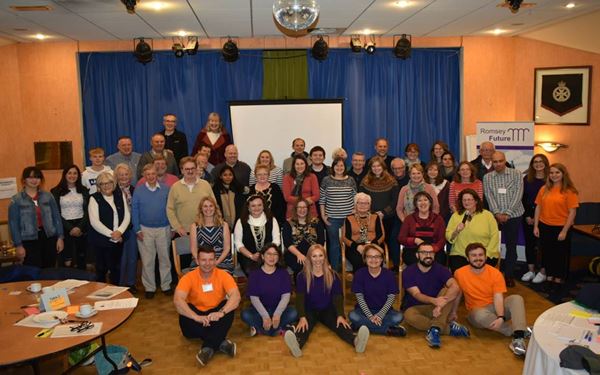
Romsey citizens’ assembly makes proposals to transform area south of the town centre
Romsey’s pioneering citizens’ assembly has today announced its recommendations to transform the area south of the town centre.
The Romsey citizens’ assembly heard evidence from experts in town centre regeneration, planning, environmental issues and public health as well as views from local stakeholders and examples from other towns over two weekends in November.
The assembly concluded with the 42 members voting on a number of recommendations to transform the south of the town centre, which includes the area around Crosfield Hall and the bus station.
A report outlining the recommendations has been published at www.demsoc.org/2019/12/17/final-report-romsey-citizens-assembly/ by The Democratic Society, a non-profit organisation that supports democratic involvement in the UK and EU and also helped to facilitate the assembly. The report will be presented to the council’s cabinet at a special meeting in January as well as the Romsey Future partnership by some of the members of the citizens’ assembly.
Mel Stevens, director of programmes at The Democratic Society, said: “Members of the Romsey citizens’ assembly were recruited by a random process to represent the local area, giving up their own time for the benefit of their wider community.
“Over two weekends, they’ve listened to experts, considered evidence and worked together to weigh-up options, make trade-offs and come to a set of coherent, well thought through recommendations.
“Not only have they made an important contribution to Romsey and Test Valley, they’ve helped to show that citizens can play a vital, active role in local authority decision making.”
Kevin Ditcham, local democracy delivery manager at The Democratic Society, said: “It’s been excellent to witness the community come together through the Romsey citizens’ assembly process. It has shown the amazing and exciting ideas which develop when communities are empowered to have agency and affect change in a genuine way.
“We know that too often, communities feel like they are unable to do anything about the things which matter to them. This process in Romsey has enabled 42 people, who didn’t know each other before, to make recommendations based on their aspirations for the south of the town centre. The recommendations are realistic, deliverable and meaningful because of the process. It’s fantastic that Test Valley Borough Council has invested time and energy to this and to deliberative and participative engagement approaches with citizens.”
Chair of Romsey Future and deputy leader of Test Valley Borough Council, councillor Nick Adams-King, said: “It has been brilliant to witness the power of the citizens’ assembly process. By bringing together 42 public representatives and providing them with key facts, figures and evidence, they have developed a set of well-rounded, clear, ambitious and achievable recommendations to help shape the masterplan as part of the redevelopment of the south of the town centre.
“I look forward to meeting with the council’s cabinet in January when the citizens’ assembly members will present their proposals for the first time.
“I would like to thank everyone involved in the process for their hard work.”
Test Valley Borough Council was awarded £60,000 plus expert support to run the citizens' assembly as part of the government’s Innovation in Democracy Programme, jointly delivered by the Department for Digital, Culture, Media and Sport and the Ministry for Housing, Communities and Local Government.
The assembly members were selected at random by The Sortition Foundation, after they sent invitations to 10,000 addresses in Romsey and surrounding parishes. From this, fifty individuals from the pool of responses, who broadly represented a cross-section of Romsey’s demographic profile in terms of age, gender, geography, occupation, travel frequency and ethnicity, were chosen to form the assembly.
The presentations and expert panel discussions from the citizens’ assembly were recorded and are available to view on the Romsey Future website at www.romseyfuture.org.uk/citizens-assembly. Further information and frequently asked questions about the process can also be found on the website.
